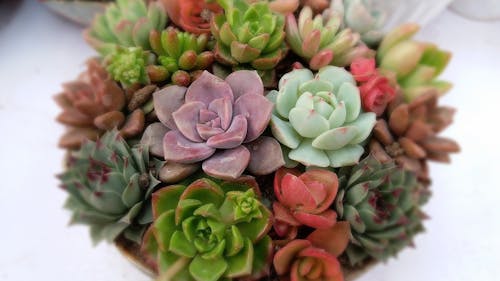FENG: Why everyone should own succulents
COLUMN: Jaded

I have a lot of succulents. So many succulents, in fact, that my mother has recently had to forbid me from purchasing anymore because we are running out of space in my house. While my hobby started off in March 2020 with only three little plants, my collection has since exploded, now featuring more than 35 succulents spanning 15 different genera.
This increase in greenery has not just been limited to my living room, though. Since the beginning of the pandemic last year, houseplants have been trending up. In the spring of 2020, plant and seed sales soared to record highs across the country as many people turned to gardening as a new hobby.
In comparison to many other sectors which suffered as the lockdown hit, such as clothing and accessory stores, electronics stores and sporting goods, garden stores saw a drastic increase in sales. In fact, the field of gardening retail saw its highest increase in sales revenue this past year since 2014.
The growth of the houseplant market has not been limited to the U.S. either. Increases in plant purchases and growing houseplant collections have been reported in Singapore, the Philippines and London.
Clearly, there is something alluring about succulents that is capturing the interests of people globally. Perhaps as justification for my own addiction, there are numerous reasons why I would also argue that succulents are a fantastic hobby to pick up during quarantine and why you should pick up some plants yourself.
At face value, succulents are just very nice to look at. The term “succulent” is not by any means a scientific one. The term is typically used to just include any plants with fleshy or thickened parts to retain water in arid environments. As a result, succulents include a wide range of plants, ranging from cacti to jade plants to snake plants, and an even wider range of colors, shapes and sizes.
For instance, while the Haworthia retusa is spiky and translucent, the plump rounded leaves of the moonstone (Pachyphytum oviferum) feature a spectrum of pastel greens, blues and purples. More than that, plants are great for adding a bit of color to a workplace that can become dull and cold after months of being stuck in the same location.
Succulents are also extremely easy to care for. As mentioned previously, the origins of many of these species are rooted in harsh arid environments. In these deserts, temperatures can fluctuate between noon time highs exceeding 100 degrees Fahrenheit and nighttime lows below freezing.
While they should optimally be kept at room temperature, succulents can thus be cared for in a variety of temperatures and are resistant to heat waves and cold shocks. Again due to their desert adaptations, succulents also require very little watering and are quite hardy.
Speaking as someone who is horticulturally hopeless, I can say with confidence that it is virtually impossible to kill these guys. For succulents specifically, the only thing you have to be careful of is overwatering!
Beyond that, succulents are great for one’s physical and mental health. Of course, all plants convert carbon dioxide to oxygen, but certain plants are also capable of cleaning the air. For instance, the snake plant (which is incidentally also a succulent) is able to soak up trichloroethylene, xylene, formaldehyde and benzene from the air.
While you would need an absurd number of plants to actually have an effect on the air quality of your house, one or two snake plants are still nice to have.
When it comes to mental health, caring for plants also aids in alleviating many detrimental conditions. The healing properties of nature have long been touted, and the field of therapeutic horticulture has been around since the 19th century. Contemporary research has similarly shown that interaction with plants can reduce stress by decreasing blood pressure and suppressing the sympathetic nervous system.
Furthermore, botanic work has been shown to reduce symptoms of depression, improve symptoms of attention deficit hyperactivity disorder and improve focus! Seeing your succulent continue to grow and thrive during rough times automatically provides a sense of stability, which is something I think we all could use still.
Succulents are great to have overall. They are nice to look at, easy to care for and provide a myriad of health benefits. As a proud plant padre myself, I am of course a little bit biased regarding succulent care.
Observing the latest growth in my aloe vera or seeing the latest pups from my panda plants never fails to bring a smile to my face. Succulents are a great place to start off with for anyone even considering getting a plant, and I cannot recommend enough for you to pick up a little quarantine buddy for yourself.
Now if you will excuse me, I have some plants to water.
William Feng is a School of Environmental and Biological Sciences sophomore majoring in computer science and bioinformatics and minoring in biochemistry. His column, "Jaded," runs on alternate Wednesdays.
*Columns, cartoons and letters do not necessarily reflect the views of the Targum Publishing Company or its staff.
YOUR VOICE | The Daily Targum welcomes submissions from all readers. Due to space limitations in our print newspaper, letters to the editor must not exceed 900 words. Guest columns and commentaries must be between 700 and 900 words. All authors must include their name, phone number, class year and college affiliation or department to be considered for publication. Please submit via email to oped@dailytargum.com by 4 p.m. to be considered for the following day’s publication. Columns, cartoons and letters do not necessarily reflect the views of the Targum Publishing Company or its staff.



